Exploring the Impact of Music on Cognition and Emotion: Psychology
VerifiedAdded on 2023/06/11
|8
|2507
|398
Essay
AI Summary
This essay delves into the multifaceted impact of music on cognitive functions, emotions, and the changing lifespan of individuals. It highlights how different genres of music affect cognitive abilities, with sedative music proving more beneficial for academic performance. The essay further explores the intricate connection between music and emotions, emphasizing music's ability to evoke and regulate emotions through various psychological mechanisms such as brain stem reflexes, evaluative conditioning, emotional contagion, visual imagery, episodic memory, and musical expectancy. Furthermore, the study investigates the effects of music on older adults, noting its potential to enhance processing speed and memory. Ultimately, the essay concludes that music, particularly soothing and relaxing music, can significantly improve cognitive abilities, emotional well-being, and overall quality of life throughout one's lifespan. Desklib provides access to this essay and many other resources for students.
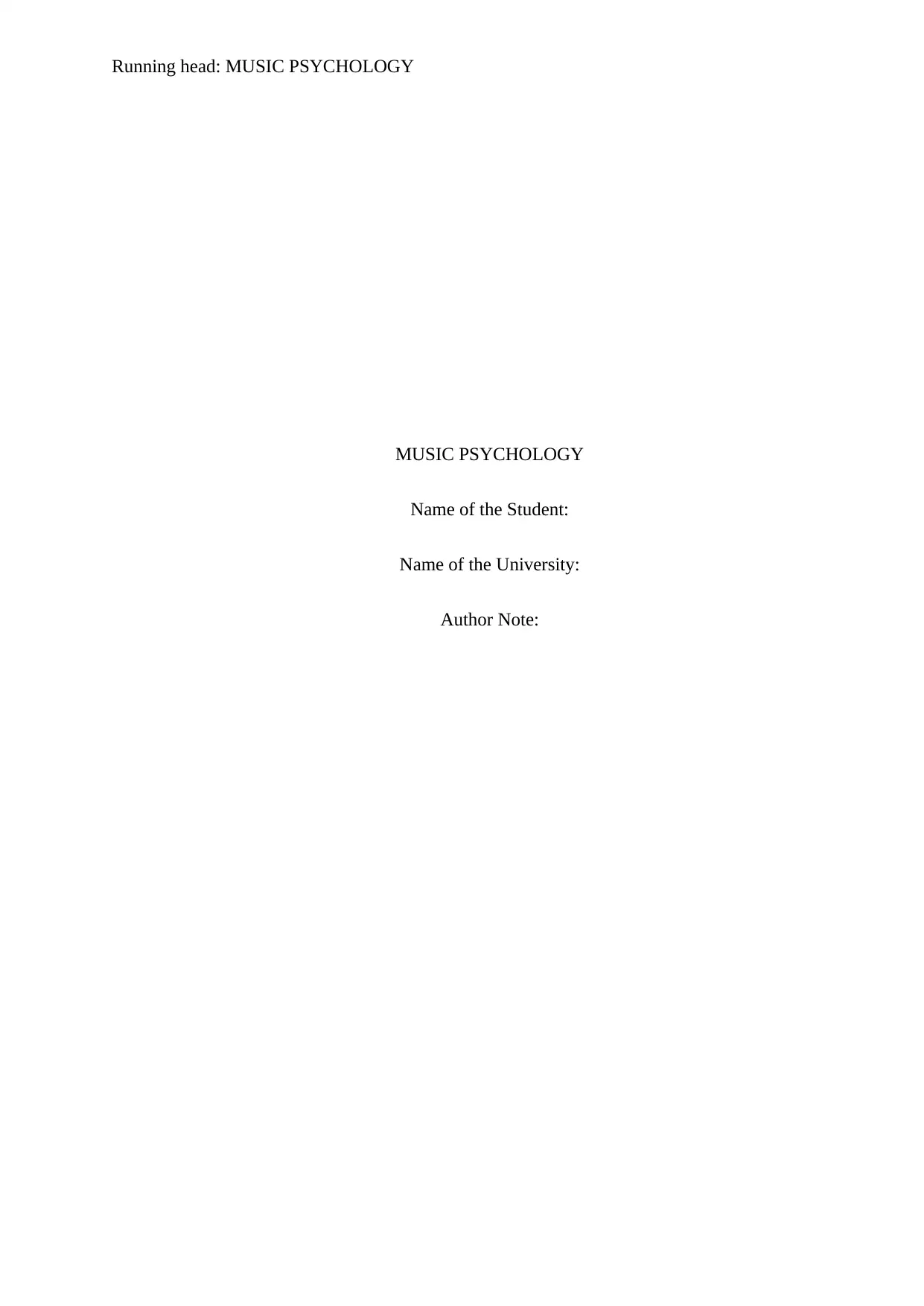
Running head: MUSIC PSYCHOLOGY
MUSIC PSYCHOLOGY
Name of the Student:
Name of the University:
Author Note:
MUSIC PSYCHOLOGY
Name of the Student:
Name of the University:
Author Note:
Paraphrase This Document
Need a fresh take? Get an instant paraphrase of this document with our AI Paraphraser
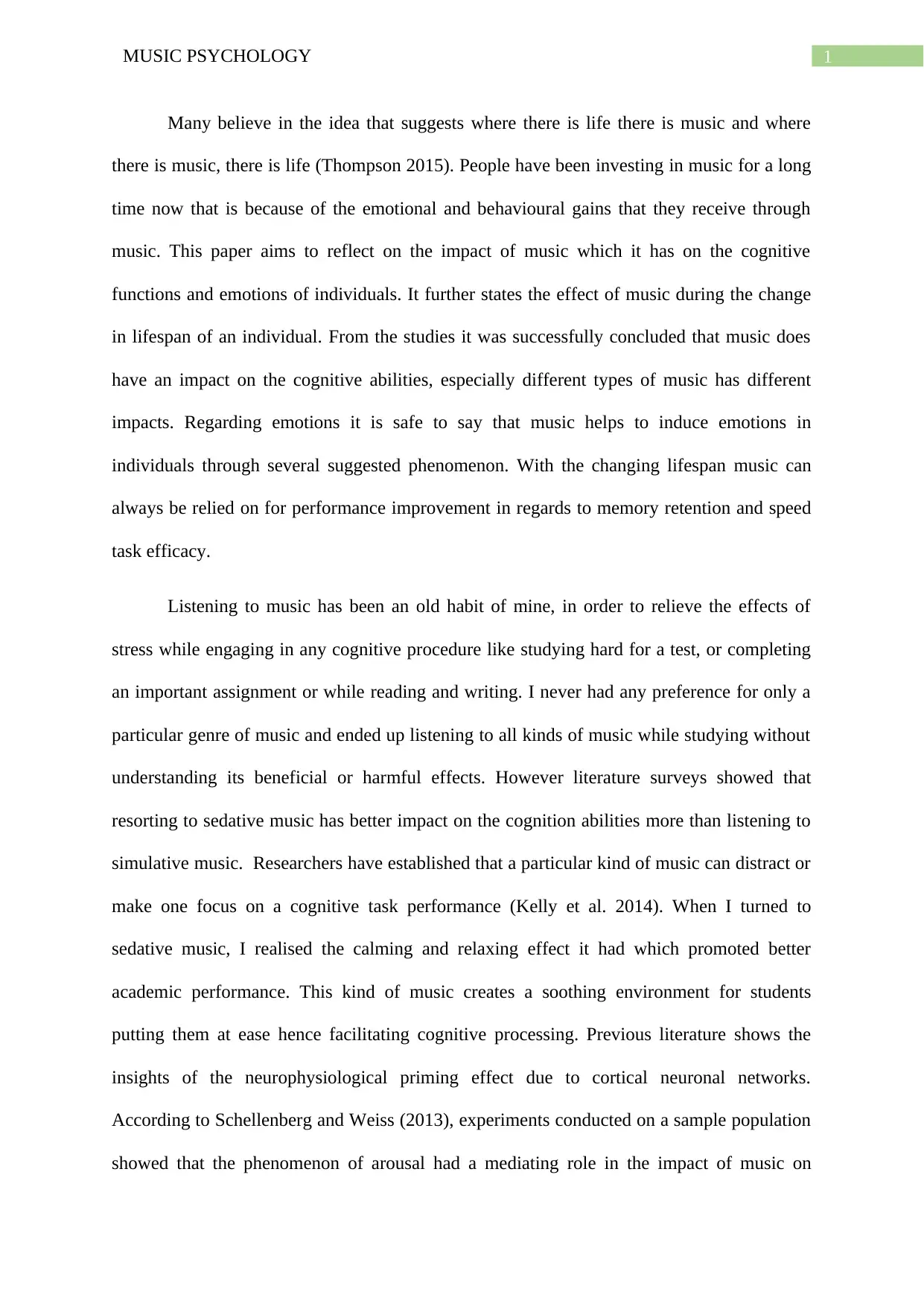
1MUSIC PSYCHOLOGY
Many believe in the idea that suggests where there is life there is music and where
there is music, there is life (Thompson 2015). People have been investing in music for a long
time now that is because of the emotional and behavioural gains that they receive through
music. This paper aims to reflect on the impact of music which it has on the cognitive
functions and emotions of individuals. It further states the effect of music during the change
in lifespan of an individual. From the studies it was successfully concluded that music does
have an impact on the cognitive abilities, especially different types of music has different
impacts. Regarding emotions it is safe to say that music helps to induce emotions in
individuals through several suggested phenomenon. With the changing lifespan music can
always be relied on for performance improvement in regards to memory retention and speed
task efficacy.
Listening to music has been an old habit of mine, in order to relieve the effects of
stress while engaging in any cognitive procedure like studying hard for a test, or completing
an important assignment or while reading and writing. I never had any preference for only a
particular genre of music and ended up listening to all kinds of music while studying without
understanding its beneficial or harmful effects. However literature surveys showed that
resorting to sedative music has better impact on the cognition abilities more than listening to
simulative music. Researchers have established that a particular kind of music can distract or
make one focus on a cognitive task performance (Kelly et al. 2014). When I turned to
sedative music, I realised the calming and relaxing effect it had which promoted better
academic performance. This kind of music creates a soothing environment for students
putting them at ease hence facilitating cognitive processing. Previous literature shows the
insights of the neurophysiological priming effect due to cortical neuronal networks.
According to Schellenberg and Weiss (2013), experiments conducted on a sample population
showed that the phenomenon of arousal had a mediating role in the impact of music on
Many believe in the idea that suggests where there is life there is music and where
there is music, there is life (Thompson 2015). People have been investing in music for a long
time now that is because of the emotional and behavioural gains that they receive through
music. This paper aims to reflect on the impact of music which it has on the cognitive
functions and emotions of individuals. It further states the effect of music during the change
in lifespan of an individual. From the studies it was successfully concluded that music does
have an impact on the cognitive abilities, especially different types of music has different
impacts. Regarding emotions it is safe to say that music helps to induce emotions in
individuals through several suggested phenomenon. With the changing lifespan music can
always be relied on for performance improvement in regards to memory retention and speed
task efficacy.
Listening to music has been an old habit of mine, in order to relieve the effects of
stress while engaging in any cognitive procedure like studying hard for a test, or completing
an important assignment or while reading and writing. I never had any preference for only a
particular genre of music and ended up listening to all kinds of music while studying without
understanding its beneficial or harmful effects. However literature surveys showed that
resorting to sedative music has better impact on the cognition abilities more than listening to
simulative music. Researchers have established that a particular kind of music can distract or
make one focus on a cognitive task performance (Kelly et al. 2014). When I turned to
sedative music, I realised the calming and relaxing effect it had which promoted better
academic performance. This kind of music creates a soothing environment for students
putting them at ease hence facilitating cognitive processing. Previous literature shows the
insights of the neurophysiological priming effect due to cortical neuronal networks.
According to Schellenberg and Weiss (2013), experiments conducted on a sample population
showed that the phenomenon of arousal had a mediating role in the impact of music on
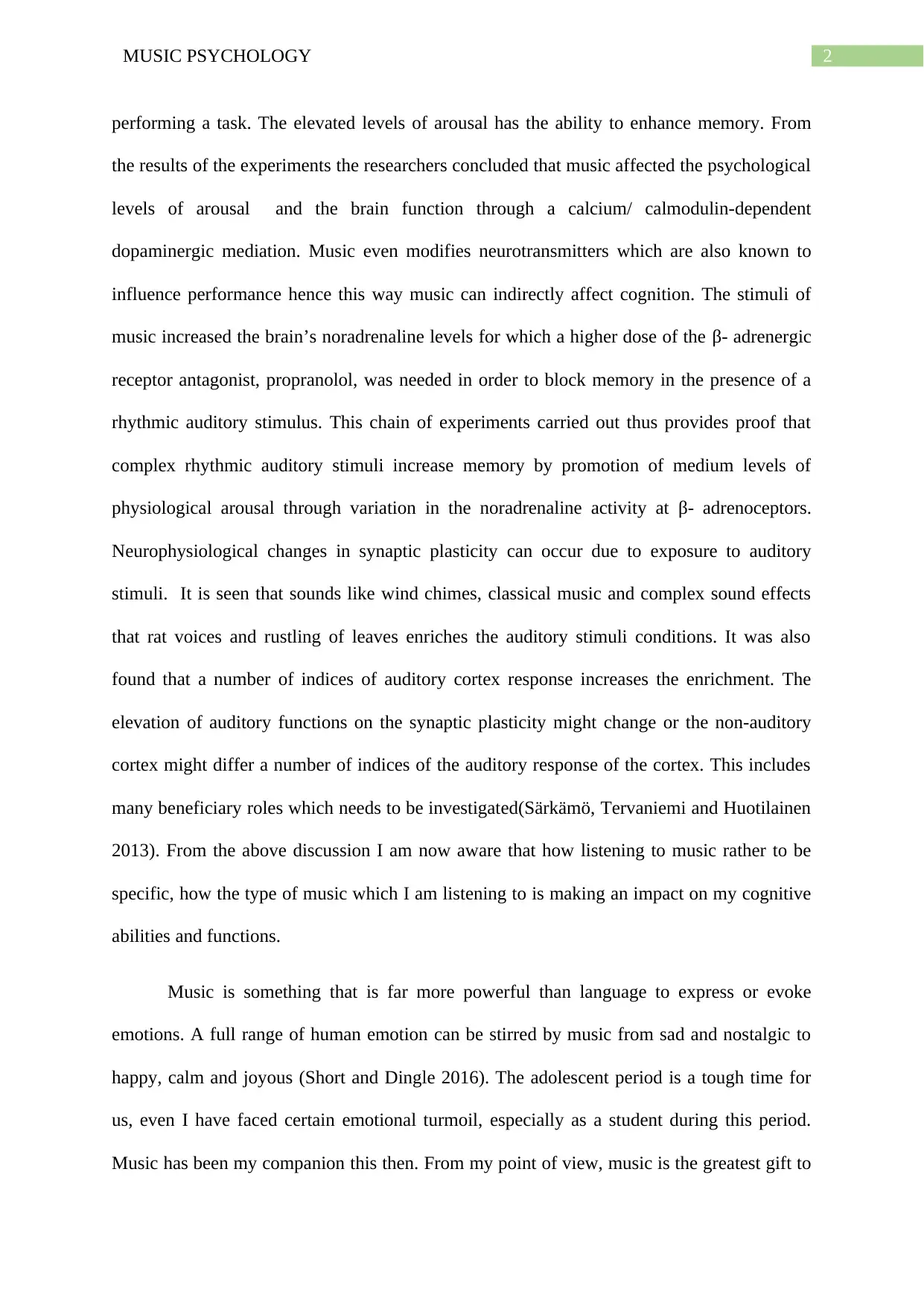
2MUSIC PSYCHOLOGY
performing a task. The elevated levels of arousal has the ability to enhance memory. From
the results of the experiments the researchers concluded that music affected the psychological
levels of arousal and the brain function through a calcium/ calmodulin-dependent
dopaminergic mediation. Music even modifies neurotransmitters which are also known to
influence performance hence this way music can indirectly affect cognition. The stimuli of
music increased the brain’s noradrenaline levels for which a higher dose of the β- adrenergic
receptor antagonist, propranolol, was needed in order to block memory in the presence of a
rhythmic auditory stimulus. This chain of experiments carried out thus provides proof that
complex rhythmic auditory stimuli increase memory by promotion of medium levels of
physiological arousal through variation in the noradrenaline activity at β- adrenoceptors.
Neurophysiological changes in synaptic plasticity can occur due to exposure to auditory
stimuli. It is seen that sounds like wind chimes, classical music and complex sound effects
that rat voices and rustling of leaves enriches the auditory stimuli conditions. It was also
found that a number of indices of auditory cortex response increases the enrichment. The
elevation of auditory functions on the synaptic plasticity might change or the non-auditory
cortex might differ a number of indices of the auditory response of the cortex. This includes
many beneficiary roles which needs to be investigated(Särkämö, Tervaniemi and Huotilainen
2013). From the above discussion I am now aware that how listening to music rather to be
specific, how the type of music which I am listening to is making an impact on my cognitive
abilities and functions.
Music is something that is far more powerful than language to express or evoke
emotions. A full range of human emotion can be stirred by music from sad and nostalgic to
happy, calm and joyous (Short and Dingle 2016). The adolescent period is a tough time for
us, even I have faced certain emotional turmoil, especially as a student during this period.
Music has been my companion this then. From my point of view, music is the greatest gift to
performing a task. The elevated levels of arousal has the ability to enhance memory. From
the results of the experiments the researchers concluded that music affected the psychological
levels of arousal and the brain function through a calcium/ calmodulin-dependent
dopaminergic mediation. Music even modifies neurotransmitters which are also known to
influence performance hence this way music can indirectly affect cognition. The stimuli of
music increased the brain’s noradrenaline levels for which a higher dose of the β- adrenergic
receptor antagonist, propranolol, was needed in order to block memory in the presence of a
rhythmic auditory stimulus. This chain of experiments carried out thus provides proof that
complex rhythmic auditory stimuli increase memory by promotion of medium levels of
physiological arousal through variation in the noradrenaline activity at β- adrenoceptors.
Neurophysiological changes in synaptic plasticity can occur due to exposure to auditory
stimuli. It is seen that sounds like wind chimes, classical music and complex sound effects
that rat voices and rustling of leaves enriches the auditory stimuli conditions. It was also
found that a number of indices of auditory cortex response increases the enrichment. The
elevation of auditory functions on the synaptic plasticity might change or the non-auditory
cortex might differ a number of indices of the auditory response of the cortex. This includes
many beneficiary roles which needs to be investigated(Särkämö, Tervaniemi and Huotilainen
2013). From the above discussion I am now aware that how listening to music rather to be
specific, how the type of music which I am listening to is making an impact on my cognitive
abilities and functions.
Music is something that is far more powerful than language to express or evoke
emotions. A full range of human emotion can be stirred by music from sad and nostalgic to
happy, calm and joyous (Short and Dingle 2016). The adolescent period is a tough time for
us, even I have faced certain emotional turmoil, especially as a student during this period.
Music has been my companion this then. From my point of view, music is the greatest gift to
⊘ This is a preview!⊘
Do you want full access?
Subscribe today to unlock all pages.

Trusted by 1+ million students worldwide
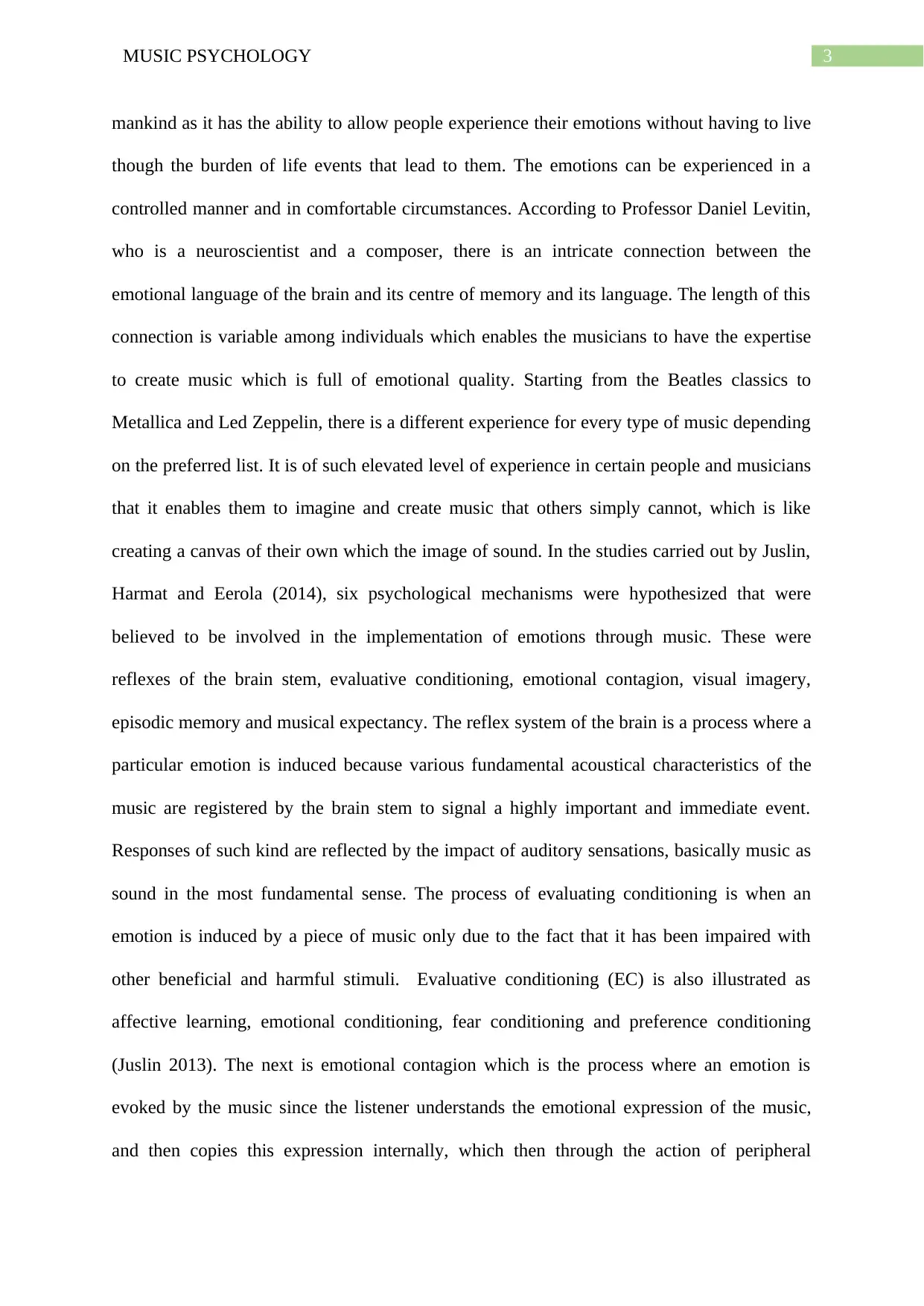
3MUSIC PSYCHOLOGY
mankind as it has the ability to allow people experience their emotions without having to live
though the burden of life events that lead to them. The emotions can be experienced in a
controlled manner and in comfortable circumstances. According to Professor Daniel Levitin,
who is a neuroscientist and a composer, there is an intricate connection between the
emotional language of the brain and its centre of memory and its language. The length of this
connection is variable among individuals which enables the musicians to have the expertise
to create music which is full of emotional quality. Starting from the Beatles classics to
Metallica and Led Zeppelin, there is a different experience for every type of music depending
on the preferred list. It is of such elevated level of experience in certain people and musicians
that it enables them to imagine and create music that others simply cannot, which is like
creating a canvas of their own which the image of sound. In the studies carried out by Juslin,
Harmat and Eerola (2014), six psychological mechanisms were hypothesized that were
believed to be involved in the implementation of emotions through music. These were
reflexes of the brain stem, evaluative conditioning, emotional contagion, visual imagery,
episodic memory and musical expectancy. The reflex system of the brain is a process where a
particular emotion is induced because various fundamental acoustical characteristics of the
music are registered by the brain stem to signal a highly important and immediate event.
Responses of such kind are reflected by the impact of auditory sensations, basically music as
sound in the most fundamental sense. The process of evaluating conditioning is when an
emotion is induced by a piece of music only due to the fact that it has been impaired with
other beneficial and harmful stimuli. Evaluative conditioning (EC) is also illustrated as
affective learning, emotional conditioning, fear conditioning and preference conditioning
(Juslin 2013). The next is emotional contagion which is the process where an emotion is
evoked by the music since the listener understands the emotional expression of the music,
and then copies this expression internally, which then through the action of peripheral
mankind as it has the ability to allow people experience their emotions without having to live
though the burden of life events that lead to them. The emotions can be experienced in a
controlled manner and in comfortable circumstances. According to Professor Daniel Levitin,
who is a neuroscientist and a composer, there is an intricate connection between the
emotional language of the brain and its centre of memory and its language. The length of this
connection is variable among individuals which enables the musicians to have the expertise
to create music which is full of emotional quality. Starting from the Beatles classics to
Metallica and Led Zeppelin, there is a different experience for every type of music depending
on the preferred list. It is of such elevated level of experience in certain people and musicians
that it enables them to imagine and create music that others simply cannot, which is like
creating a canvas of their own which the image of sound. In the studies carried out by Juslin,
Harmat and Eerola (2014), six psychological mechanisms were hypothesized that were
believed to be involved in the implementation of emotions through music. These were
reflexes of the brain stem, evaluative conditioning, emotional contagion, visual imagery,
episodic memory and musical expectancy. The reflex system of the brain is a process where a
particular emotion is induced because various fundamental acoustical characteristics of the
music are registered by the brain stem to signal a highly important and immediate event.
Responses of such kind are reflected by the impact of auditory sensations, basically music as
sound in the most fundamental sense. The process of evaluating conditioning is when an
emotion is induced by a piece of music only due to the fact that it has been impaired with
other beneficial and harmful stimuli. Evaluative conditioning (EC) is also illustrated as
affective learning, emotional conditioning, fear conditioning and preference conditioning
(Juslin 2013). The next is emotional contagion which is the process where an emotion is
evoked by the music since the listener understands the emotional expression of the music,
and then copies this expression internally, which then through the action of peripheral
Paraphrase This Document
Need a fresh take? Get an instant paraphrase of this document with our AI Paraphraser
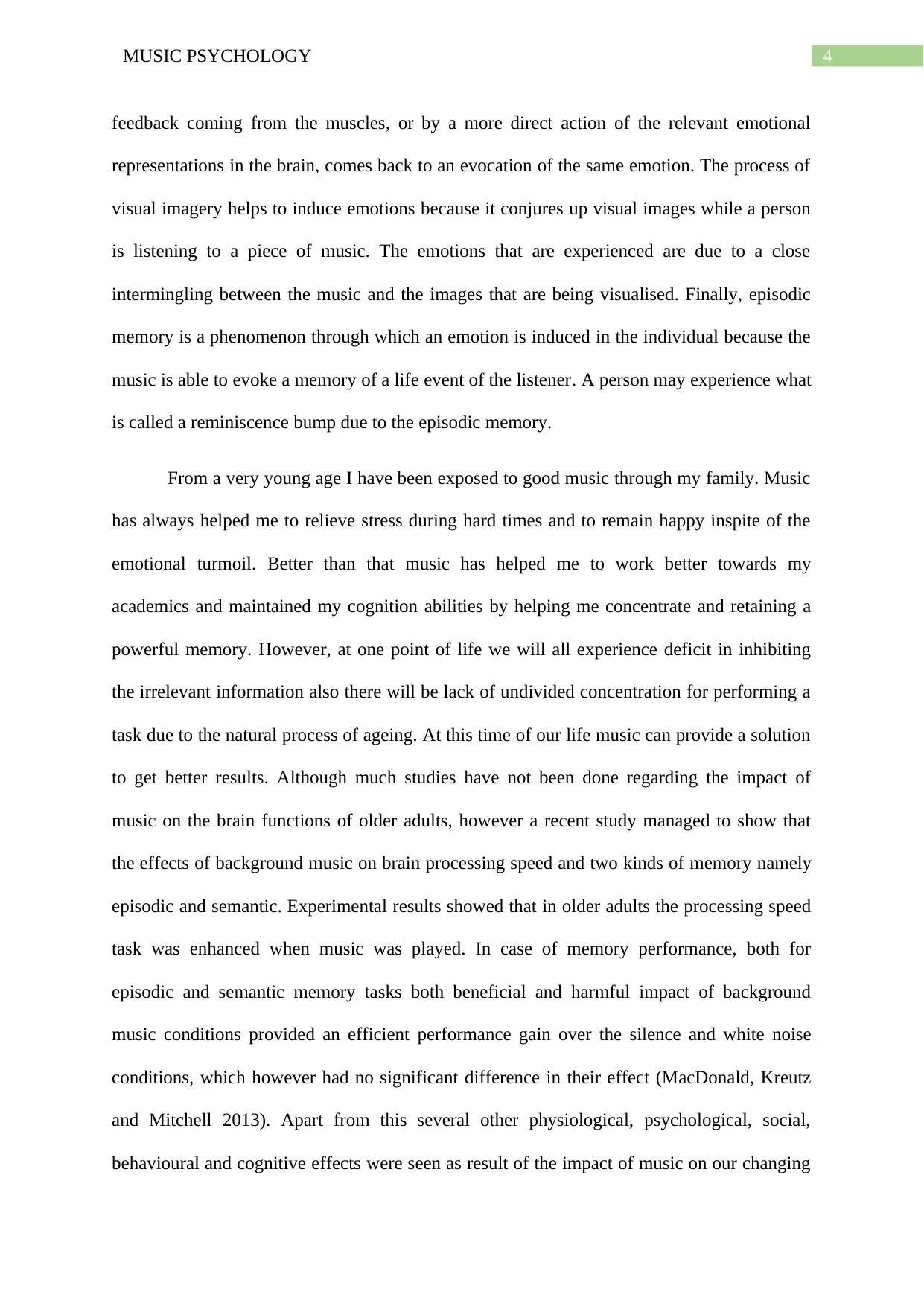
4MUSIC PSYCHOLOGY
feedback coming from the muscles, or by a more direct action of the relevant emotional
representations in the brain, comes back to an evocation of the same emotion. The process of
visual imagery helps to induce emotions because it conjures up visual images while a person
is listening to a piece of music. The emotions that are experienced are due to a close
intermingling between the music and the images that are being visualised. Finally, episodic
memory is a phenomenon through which an emotion is induced in the individual because the
music is able to evoke a memory of a life event of the listener. A person may experience what
is called a reminiscence bump due to the episodic memory.
From a very young age I have been exposed to good music through my family. Music
has always helped me to relieve stress during hard times and to remain happy inspite of the
emotional turmoil. Better than that music has helped me to work better towards my
academics and maintained my cognition abilities by helping me concentrate and retaining a
powerful memory. However, at one point of life we will all experience deficit in inhibiting
the irrelevant information also there will be lack of undivided concentration for performing a
task due to the natural process of ageing. At this time of our life music can provide a solution
to get better results. Although much studies have not been done regarding the impact of
music on the brain functions of older adults, however a recent study managed to show that
the effects of background music on brain processing speed and two kinds of memory namely
episodic and semantic. Experimental results showed that in older adults the processing speed
task was enhanced when music was played. In case of memory performance, both for
episodic and semantic memory tasks both beneficial and harmful impact of background
music conditions provided an efficient performance gain over the silence and white noise
conditions, which however had no significant difference in their effect (MacDonald, Kreutz
and Mitchell 2013). Apart from this several other physiological, psychological, social,
behavioural and cognitive effects were seen as result of the impact of music on our changing
feedback coming from the muscles, or by a more direct action of the relevant emotional
representations in the brain, comes back to an evocation of the same emotion. The process of
visual imagery helps to induce emotions because it conjures up visual images while a person
is listening to a piece of music. The emotions that are experienced are due to a close
intermingling between the music and the images that are being visualised. Finally, episodic
memory is a phenomenon through which an emotion is induced in the individual because the
music is able to evoke a memory of a life event of the listener. A person may experience what
is called a reminiscence bump due to the episodic memory.
From a very young age I have been exposed to good music through my family. Music
has always helped me to relieve stress during hard times and to remain happy inspite of the
emotional turmoil. Better than that music has helped me to work better towards my
academics and maintained my cognition abilities by helping me concentrate and retaining a
powerful memory. However, at one point of life we will all experience deficit in inhibiting
the irrelevant information also there will be lack of undivided concentration for performing a
task due to the natural process of ageing. At this time of our life music can provide a solution
to get better results. Although much studies have not been done regarding the impact of
music on the brain functions of older adults, however a recent study managed to show that
the effects of background music on brain processing speed and two kinds of memory namely
episodic and semantic. Experimental results showed that in older adults the processing speed
task was enhanced when music was played. In case of memory performance, both for
episodic and semantic memory tasks both beneficial and harmful impact of background
music conditions provided an efficient performance gain over the silence and white noise
conditions, which however had no significant difference in their effect (MacDonald, Kreutz
and Mitchell 2013). Apart from this several other physiological, psychological, social,
behavioural and cognitive effects were seen as result of the impact of music on our changing
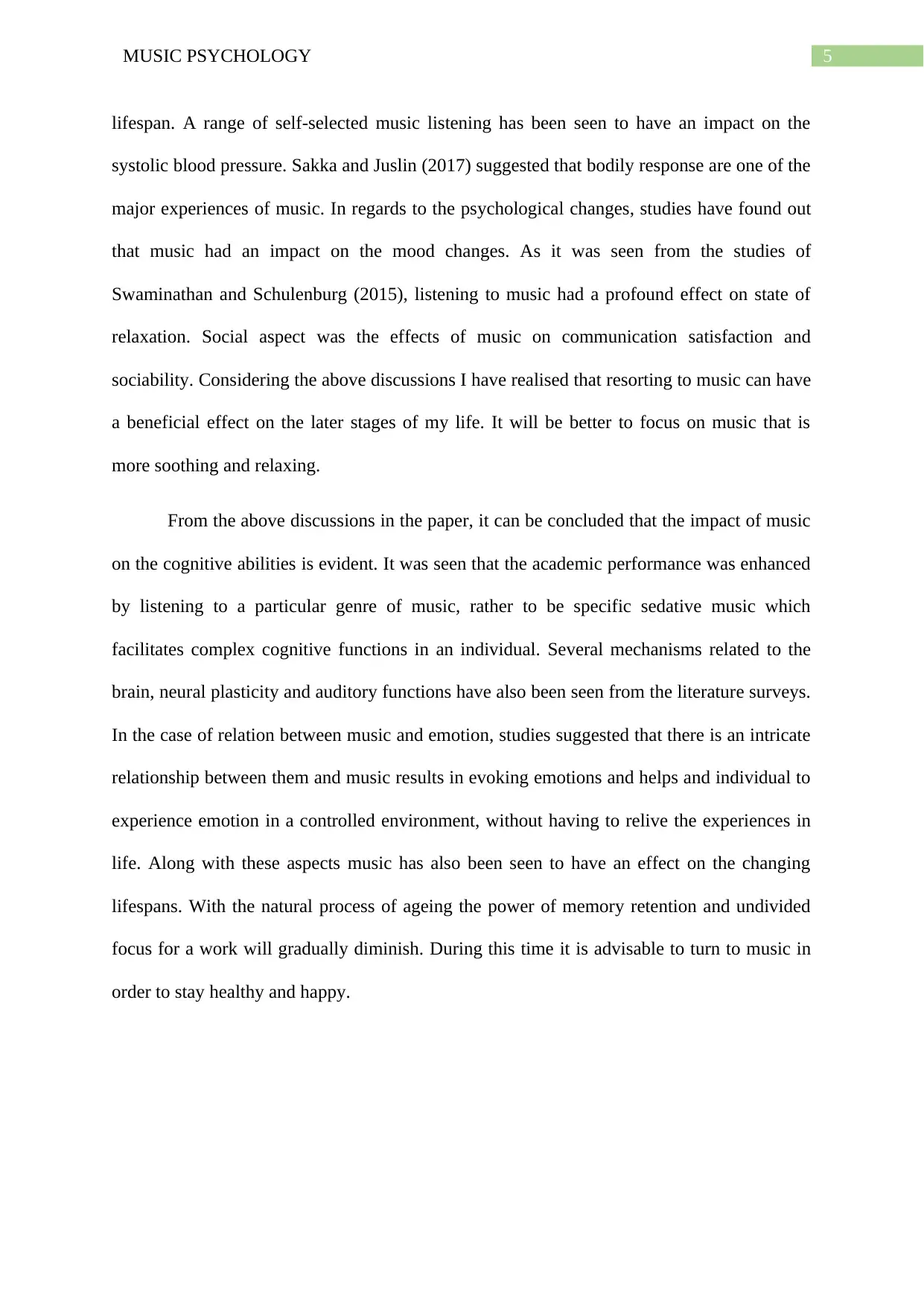
5MUSIC PSYCHOLOGY
lifespan. A range of self-selected music listening has been seen to have an impact on the
systolic blood pressure. Sakka and Juslin (2017) suggested that bodily response are one of the
major experiences of music. In regards to the psychological changes, studies have found out
that music had an impact on the mood changes. As it was seen from the studies of
Swaminathan and Schulenburg (2015), listening to music had a profound effect on state of
relaxation. Social aspect was the effects of music on communication satisfaction and
sociability. Considering the above discussions I have realised that resorting to music can have
a beneficial effect on the later stages of my life. It will be better to focus on music that is
more soothing and relaxing.
From the above discussions in the paper, it can be concluded that the impact of music
on the cognitive abilities is evident. It was seen that the academic performance was enhanced
by listening to a particular genre of music, rather to be specific sedative music which
facilitates complex cognitive functions in an individual. Several mechanisms related to the
brain, neural plasticity and auditory functions have also been seen from the literature surveys.
In the case of relation between music and emotion, studies suggested that there is an intricate
relationship between them and music results in evoking emotions and helps and individual to
experience emotion in a controlled environment, without having to relive the experiences in
life. Along with these aspects music has also been seen to have an effect on the changing
lifespans. With the natural process of ageing the power of memory retention and undivided
focus for a work will gradually diminish. During this time it is advisable to turn to music in
order to stay healthy and happy.
lifespan. A range of self-selected music listening has been seen to have an impact on the
systolic blood pressure. Sakka and Juslin (2017) suggested that bodily response are one of the
major experiences of music. In regards to the psychological changes, studies have found out
that music had an impact on the mood changes. As it was seen from the studies of
Swaminathan and Schulenburg (2015), listening to music had a profound effect on state of
relaxation. Social aspect was the effects of music on communication satisfaction and
sociability. Considering the above discussions I have realised that resorting to music can have
a beneficial effect on the later stages of my life. It will be better to focus on music that is
more soothing and relaxing.
From the above discussions in the paper, it can be concluded that the impact of music
on the cognitive abilities is evident. It was seen that the academic performance was enhanced
by listening to a particular genre of music, rather to be specific sedative music which
facilitates complex cognitive functions in an individual. Several mechanisms related to the
brain, neural plasticity and auditory functions have also been seen from the literature surveys.
In the case of relation between music and emotion, studies suggested that there is an intricate
relationship between them and music results in evoking emotions and helps and individual to
experience emotion in a controlled environment, without having to relive the experiences in
life. Along with these aspects music has also been seen to have an effect on the changing
lifespans. With the natural process of ageing the power of memory retention and undivided
focus for a work will gradually diminish. During this time it is advisable to turn to music in
order to stay healthy and happy.
⊘ This is a preview!⊘
Do you want full access?
Subscribe today to unlock all pages.

Trusted by 1+ million students worldwide
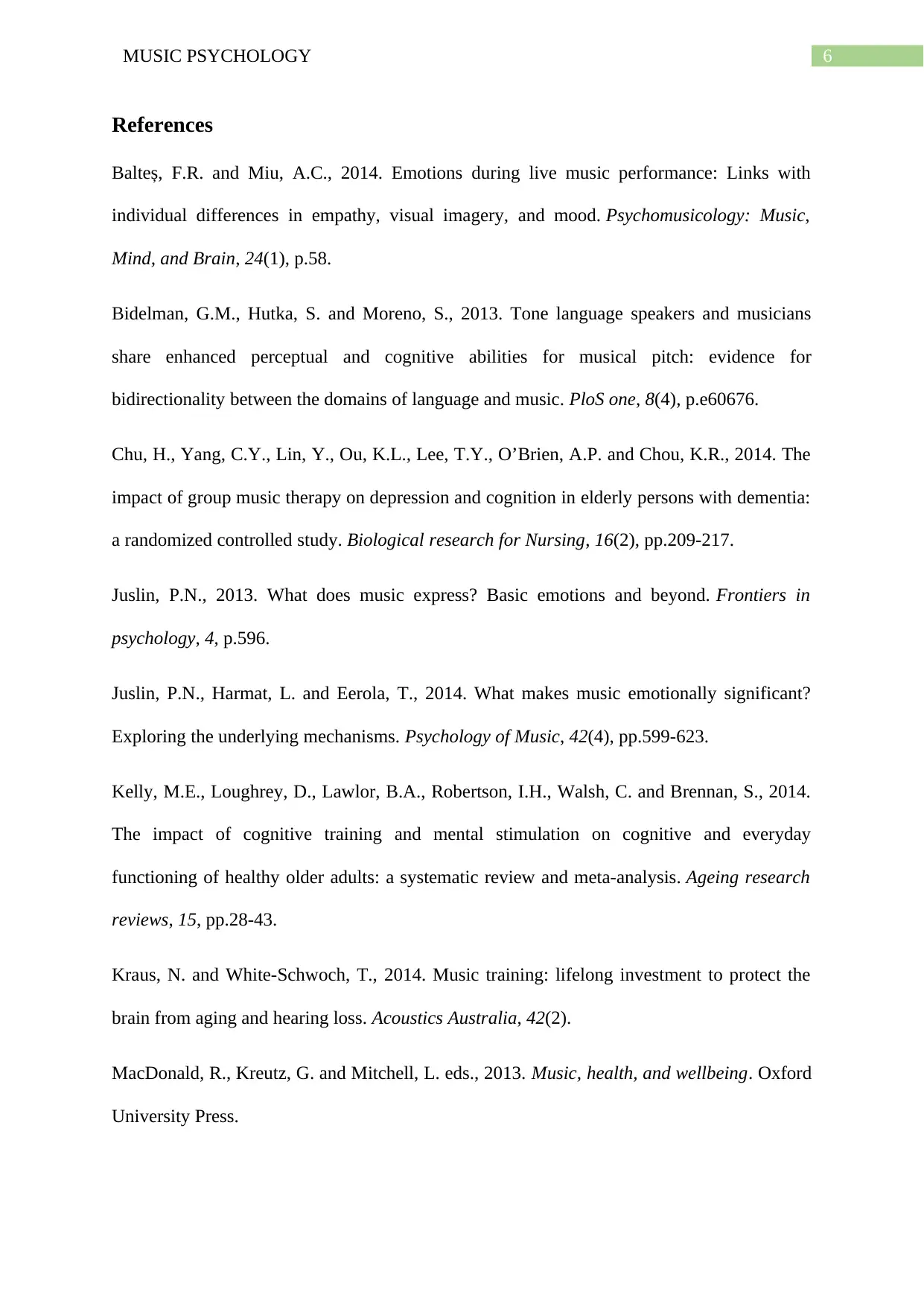
6MUSIC PSYCHOLOGY
References
Balteș, F.R. and Miu, A.C., 2014. Emotions during live music performance: Links with
individual differences in empathy, visual imagery, and mood. Psychomusicology: Music,
Mind, and Brain, 24(1), p.58.
Bidelman, G.M., Hutka, S. and Moreno, S., 2013. Tone language speakers and musicians
share enhanced perceptual and cognitive abilities for musical pitch: evidence for
bidirectionality between the domains of language and music. PloS one, 8(4), p.e60676.
Chu, H., Yang, C.Y., Lin, Y., Ou, K.L., Lee, T.Y., O’Brien, A.P. and Chou, K.R., 2014. The
impact of group music therapy on depression and cognition in elderly persons with dementia:
a randomized controlled study. Biological research for Nursing, 16(2), pp.209-217.
Juslin, P.N., 2013. What does music express? Basic emotions and beyond. Frontiers in
psychology, 4, p.596.
Juslin, P.N., Harmat, L. and Eerola, T., 2014. What makes music emotionally significant?
Exploring the underlying mechanisms. Psychology of Music, 42(4), pp.599-623.
Kelly, M.E., Loughrey, D., Lawlor, B.A., Robertson, I.H., Walsh, C. and Brennan, S., 2014.
The impact of cognitive training and mental stimulation on cognitive and everyday
functioning of healthy older adults: a systematic review and meta-analysis. Ageing research
reviews, 15, pp.28-43.
Kraus, N. and White-Schwoch, T., 2014. Music training: lifelong investment to protect the
brain from aging and hearing loss. Acoustics Australia, 42(2).
MacDonald, R., Kreutz, G. and Mitchell, L. eds., 2013. Music, health, and wellbeing. Oxford
University Press.
References
Balteș, F.R. and Miu, A.C., 2014. Emotions during live music performance: Links with
individual differences in empathy, visual imagery, and mood. Psychomusicology: Music,
Mind, and Brain, 24(1), p.58.
Bidelman, G.M., Hutka, S. and Moreno, S., 2013. Tone language speakers and musicians
share enhanced perceptual and cognitive abilities for musical pitch: evidence for
bidirectionality between the domains of language and music. PloS one, 8(4), p.e60676.
Chu, H., Yang, C.Y., Lin, Y., Ou, K.L., Lee, T.Y., O’Brien, A.P. and Chou, K.R., 2014. The
impact of group music therapy on depression and cognition in elderly persons with dementia:
a randomized controlled study. Biological research for Nursing, 16(2), pp.209-217.
Juslin, P.N., 2013. What does music express? Basic emotions and beyond. Frontiers in
psychology, 4, p.596.
Juslin, P.N., Harmat, L. and Eerola, T., 2014. What makes music emotionally significant?
Exploring the underlying mechanisms. Psychology of Music, 42(4), pp.599-623.
Kelly, M.E., Loughrey, D., Lawlor, B.A., Robertson, I.H., Walsh, C. and Brennan, S., 2014.
The impact of cognitive training and mental stimulation on cognitive and everyday
functioning of healthy older adults: a systematic review and meta-analysis. Ageing research
reviews, 15, pp.28-43.
Kraus, N. and White-Schwoch, T., 2014. Music training: lifelong investment to protect the
brain from aging and hearing loss. Acoustics Australia, 42(2).
MacDonald, R., Kreutz, G. and Mitchell, L. eds., 2013. Music, health, and wellbeing. Oxford
University Press.
Paraphrase This Document
Need a fresh take? Get an instant paraphrase of this document with our AI Paraphraser
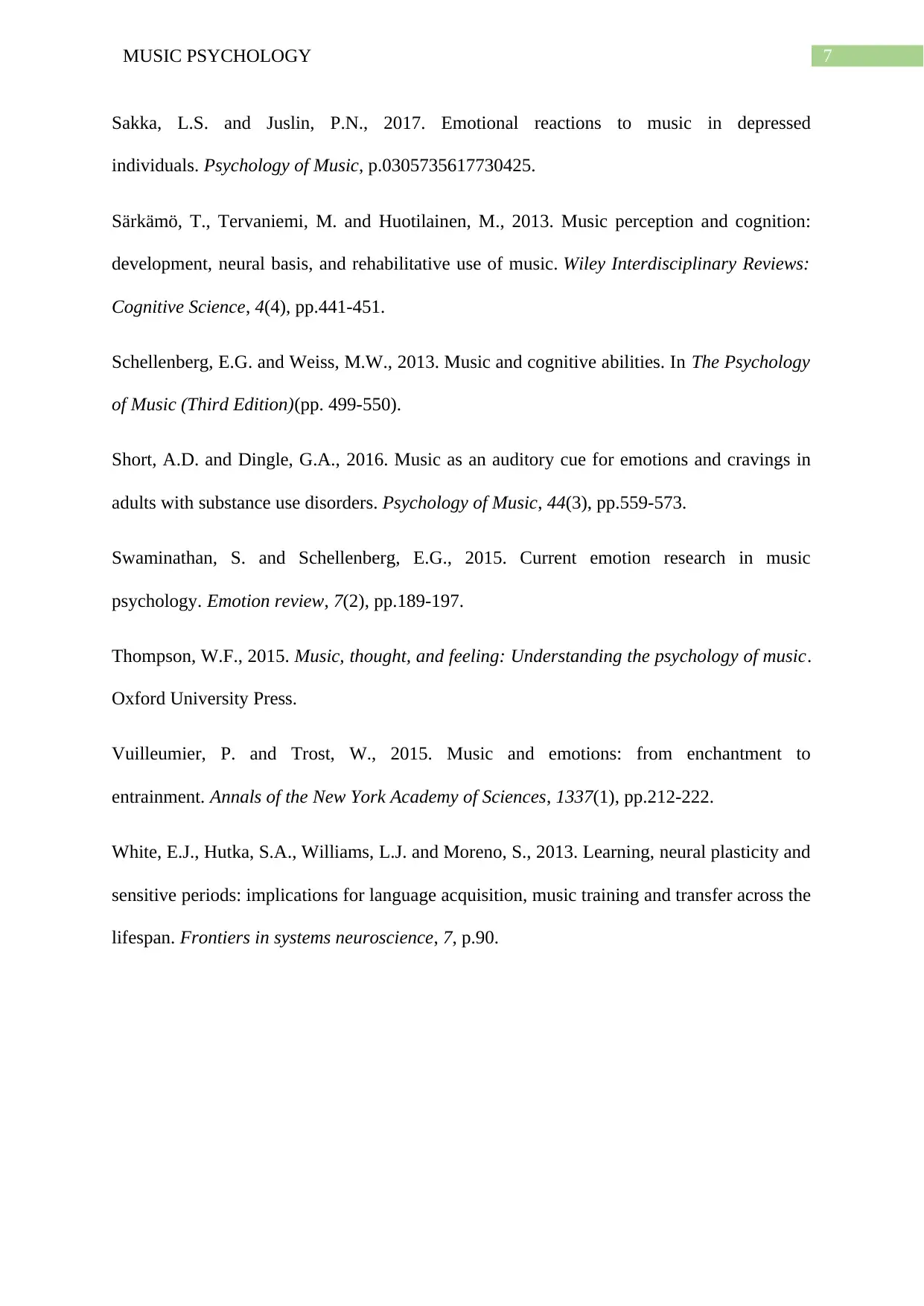
7MUSIC PSYCHOLOGY
Sakka, L.S. and Juslin, P.N., 2017. Emotional reactions to music in depressed
individuals. Psychology of Music, p.0305735617730425.
Särkämö, T., Tervaniemi, M. and Huotilainen, M., 2013. Music perception and cognition:
development, neural basis, and rehabilitative use of music. Wiley Interdisciplinary Reviews:
Cognitive Science, 4(4), pp.441-451.
Schellenberg, E.G. and Weiss, M.W., 2013. Music and cognitive abilities. In The Psychology
of Music (Third Edition)(pp. 499-550).
Short, A.D. and Dingle, G.A., 2016. Music as an auditory cue for emotions and cravings in
adults with substance use disorders. Psychology of Music, 44(3), pp.559-573.
Swaminathan, S. and Schellenberg, E.G., 2015. Current emotion research in music
psychology. Emotion review, 7(2), pp.189-197.
Thompson, W.F., 2015. Music, thought, and feeling: Understanding the psychology of music.
Oxford University Press.
Vuilleumier, P. and Trost, W., 2015. Music and emotions: from enchantment to
entrainment. Annals of the New York Academy of Sciences, 1337(1), pp.212-222.
White, E.J., Hutka, S.A., Williams, L.J. and Moreno, S., 2013. Learning, neural plasticity and
sensitive periods: implications for language acquisition, music training and transfer across the
lifespan. Frontiers in systems neuroscience, 7, p.90.
Sakka, L.S. and Juslin, P.N., 2017. Emotional reactions to music in depressed
individuals. Psychology of Music, p.0305735617730425.
Särkämö, T., Tervaniemi, M. and Huotilainen, M., 2013. Music perception and cognition:
development, neural basis, and rehabilitative use of music. Wiley Interdisciplinary Reviews:
Cognitive Science, 4(4), pp.441-451.
Schellenberg, E.G. and Weiss, M.W., 2013. Music and cognitive abilities. In The Psychology
of Music (Third Edition)(pp. 499-550).
Short, A.D. and Dingle, G.A., 2016. Music as an auditory cue for emotions and cravings in
adults with substance use disorders. Psychology of Music, 44(3), pp.559-573.
Swaminathan, S. and Schellenberg, E.G., 2015. Current emotion research in music
psychology. Emotion review, 7(2), pp.189-197.
Thompson, W.F., 2015. Music, thought, and feeling: Understanding the psychology of music.
Oxford University Press.
Vuilleumier, P. and Trost, W., 2015. Music and emotions: from enchantment to
entrainment. Annals of the New York Academy of Sciences, 1337(1), pp.212-222.
White, E.J., Hutka, S.A., Williams, L.J. and Moreno, S., 2013. Learning, neural plasticity and
sensitive periods: implications for language acquisition, music training and transfer across the
lifespan. Frontiers in systems neuroscience, 7, p.90.
1 out of 8
Your All-in-One AI-Powered Toolkit for Academic Success.
+13062052269
info@desklib.com
Available 24*7 on WhatsApp / Email
![[object Object]](/_next/static/media/star-bottom.7253800d.svg)
Unlock your academic potential
Copyright © 2020–2026 A2Z Services. All Rights Reserved. Developed and managed by ZUCOL.
